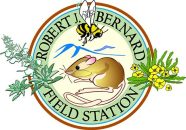Norlen, Carl (2010)
Twelve Arthropod Friends: Using Phenology to Approximate the Life History Strategies of Arthropods at the Bernard Field Station.
Bachelor of Arts, Pomona College, Biology.
Advisor: Jonathan Wright.
Studies of arthropod communities have generally found patterns of abundance closely tied to moisture availability and temperature. In Mediterranean habitats, such as Coastal Sage Scrub, conditions vary between favorable (mild and rainy) winters, and harsh (hot and dry) summers. Theory proposes that animals (arthropods) follow either a fast, slow, or intermediate life history. Fast life histories are generally associated with unfavorable habitats, while slow life histories are associated with favorable habitats. As Mediterranean biomes can be characterized as seasonally varying between favorable and unfavorable researchers have proposed that organisms with characteristics of both fast and slow life histories as well as those adapted to adverse conditions should be favored. Due to the relative lack of research on the arthropod community in Coastal Sage Scrub I have collected periodic samples at the Bernard Field Station with the goal of characterizing the seasonal patterns of these organisms. The patterns of seasonal abundance from these samples suggest that microarthropods (bristletails, springtails, and mites) fit most closely into the definition of a fast life history, while other arthropods (leaf hopper, beetles, ants) have more variable phenologies.
